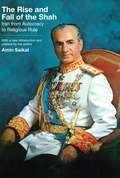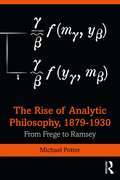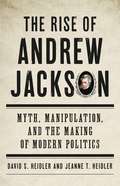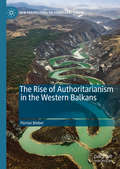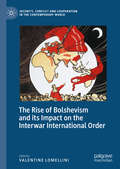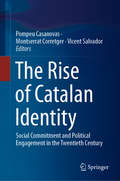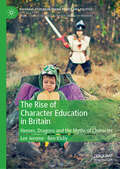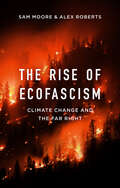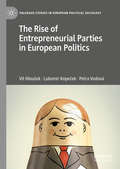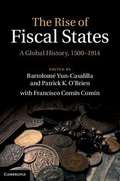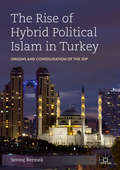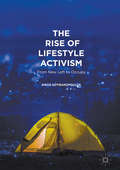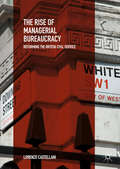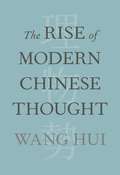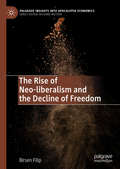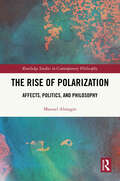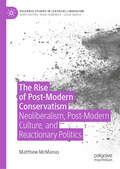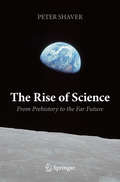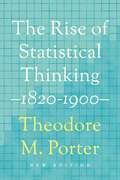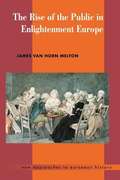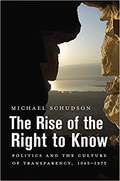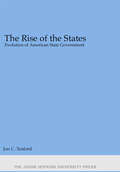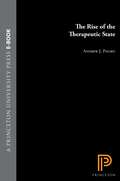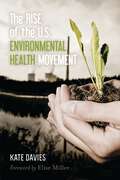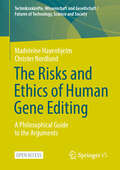- Table View
- List View
The Rise and Fall of the Shah: Iran from Autocracy to Religious Rule
by Amin SaikalOn November 4, 1979, when students occupied the American Embassy in Tehran and subsequently demanded that the United States return the Shah in exchange for hostages, the deposed Iranian ruler's regime became the focus of worldwide scrutiny and controversy. But, as Amin Saikal shows, this was far from the beginning of Iran's troubles. Saikal examines the rule of Mohammad Reza Shah Pahlavi, especially from 1953 to 1979, in the context of his regime's dependence on the United States and his dreams of transforming Iran into a world power. Saikal argues that, despite the Shah's early achievements, his goals and policies were full of inherent contradictions and weaknesses and ultimately failed to achieve their objectives. Based on government documents, published and unpublished literature, and interviews with officials in Iran, Britain, and the United States, The Rise and Fall of the Shah critically reviews the domestic and foreign policy objectives--as well as the behavior--of the Shah to explain not only what happened, but how and why. In a new introduction, Saikal reflects on what has happened in Iran since the fall of the Shah and relates Iran's past to its political present and future.
The Rise of Analytic Philosophy, 1879–1930: From Frege to Ramsey
by Michael PotterIn this book Michael Potter offers a fresh and compelling portrait of the birth of modern analytic philosophy, viewed through the lens of a detailed study of the work of the four philosophers who contributed most to shaping it: Gottlob Frege, Bertrand Russell, Ludwig Wittgenstein, and Frank Ramsey. It covers the remarkable period of discovery that began with the publication of Frege's Begriffsschrift in 1879 and ended with Ramsey's death in 1930. Potter—one of the most influential scholars of this period in philosophy—presents a deep but accessible account of the break with absolute idealism and neo-Kantianism, and the emergence of approaches that exploited the newly discovered methods in logic. Like his subjects, Potter focusses principally on philosophical logic, philosophy of mathematics, and metaphysics, but he also discusses epistemology, meta-ethics, and the philosophy of language. The book is an essential starting point for any student attempting to understand the work of Frege, Russell, Wittgenstein, and Ramsey, as well as their interactions and their larger intellectual milieux. It will also be of interest to anyone who wants to cast light on current philosophical problems through a better understanding of their origins.
The Rise of Andrew Jackson: Myth, Manipulation, and the Making of Modern Politics
by David S. Heidler Jeanne T. HeidlerThe story of Andrew Jackson's improbable ascent to the White House, centered on the handlers and propagandists who made it possibleAndrew Jackson was volatile and prone to violence, and well into his forties his sole claim on the public's affections derived from his victory in a thirty-minute battle at New Orleans in early 1815. Yet those in his immediate circle believed he was a great man who should be president of the United States. Jackson's election in 1828 is usually viewed as a result of the expansion of democracy. Historians David and Jeanne Heidler argue that he actually owed his victory to his closest supporters, who wrote hagiographies of him, founded newspapers to savage his enemies, and built a political network that was always on message. In transforming a difficult man into a paragon of republican virtue, the Jacksonites exploded the old order and created a mode of electioneering that has been mimicked ever since.
The Rise of Authoritarianism in the Western Balkans (New Perspectives on South-East Europe)
by Florian BieberThis book explores the stagnation of democracy in the Western Balkans over the last decade. The author maps regional features of rising authoritarianism that mirror larger global trends and, in doing so, outlines the core mechanisms of authoritarian rule in the Balkans, with a particular focus on Serbia, Montenegro and Macedonia. These mechanisms include the creation of constant crises, the use of external powers to balance outside influences, as well as state capture. The authoritarian patterns exist alongside formal democratic institutions, resulting in competitive authoritarian regimes that use social polarization to retain power. As the countries of the Western Balkans aspire, at least formally, to join the European Union, authoritarianism is often informal.
The Rise of Bolshevism and its Impact on the Interwar International Order (Security, Conflict and Cooperation in the Contemporary World)
by Valentine LomelliniThis book examines the international impact of Bolshevism in the period between the two World Wars. It explores both the significance of the ‘Bolshevik threat’ in European countries and colonies, as well as its spread through the circulation of ideas and people during this period. Focusing on the interplay between international relations and domestic politics, the volume analyses the rise of Bolshevism on the international stage, incorporating insights from India and China. The chapters show how the interwar international order was challenged by the ideology, which infiltrated a range of political societies. While it was incapable of overthrowing national systems, Bolshevism constituted a credible threat, which favoured the spread of fascist and nationalist trends. Offering the first detailed account of the Bolshevik danger at an international level, the book draws on multi-national and multiarchival research to examine how the peril of Bolshevism paradoxically allowed a stabilization of the post-World War I Versailles system.
The Rise of Catalan Identity: Social Commitment and Political Engagement in the Twentieth Century
by Pompeu Casanovas Montserrat Corretger Vicent SalvadorThis volume helps us to understand that the current political disorders in Catalonia have deep cultural roots. It focuses on the rise of Catalan cultural, national and linguistic identity in the 20th century. What is happening in Catalonia? What lies behind its political conflicts? Catalan identity has been evolving for centuries, starting in early medieval ages (11th and 12lve centuries). It is not a modern phenomenon. The emergence of imperial Spain in the 16 c. and the French Ancien Régime in the 17 c. correlates with a decline of Catalan culture, which was politically absorbed by the Spanish state after the conquest of Barcelona in 1714. However, Catalan language and culture flourished again under the stimulus of the European Romantic Nationalism movement (known as the Renaixença in Catalonia). During the first Dictatorship (Primo de Rivera, 1923-1930), the Spanish Civil War (1936-1939), and the long Francoist era (1939-1975), Catalan language and culture were repressed, yet refurbished and reconstructed at the same time. This rise of a plural, complex, and non-homogeneous Catalan identity constitutes the subject matter of this volume. National conflicts that emerged later in the Spanish democratic state leant heavily on the life engagement and vital commitment experienced by the entrenched intellectual movements of the twentieth century in Catalonia, Valencian Country and the Balearic Islands. This book reveals the cultural and literary grassroots of these conflicts.
The Rise of Character Education in Britain: Heroes, Dragons and the Myths of Character (Palgrave Studies in Young People and Politics)
by Lee Jerome Ben KisbyWhat is character education? Why has it risen up the political agenda in the UK in recent years? And what does it mean in pedagogical practice? This book addresses these questions, challenging the individualistic and moralistic ideas underlying the clamour amongst politicians, educators and authors to promote ‘grit’, ‘resilience’ and ‘character’ in schools. Closely examining a range of teaching resources, the book shows that the development of character is wrongly presented as the solution to a wide variety of social problems, with individual citizens expected to accommodate themselves to the realities of the contemporary economic context, rather than enhancing their capacities to engage in civic and political activities to bring about changes they wish to see. The book argues that there is a tried and tested alternative to character education, which is far more likely to strengthen British democracy, namely, citizenship education.
The Rise of Ecofascism: Climate Change and the Far Right
by Sam Moore Alex RobertsThe world faces a climate crisis and an ascendant far right. Are these trends related? How does the far right think about the environment, and what openings does the coming crisis present for them? This incisive new book traces the long history of far-right environmentalism and explores how it is adapting to the contemporary world. It argues that the extreme right, after years of denying the reality of climate change, are now showing serious signs of reversing their strategy. A new generation of far-right activists has realized that impending environmental catastrophe represents their best chance yet for a return to relevance. In reality, however, their noxious blend of conspiracy, hatred and violence is no solution at all: it is the ‘eco-socialism of fools’. Only a real commitment to climate justice can save us and stop the far right in its tracks. No-one interested in the struggle against right-wing extremism and the crusade for climate justice can afford to miss this trenchant critique of burgeoning ecofascism.
The Rise of Entrepreneurial Parties in European Politics (Palgrave Studies in European Political Sociology)
by Vít Hloušek Lubomír Kopeček Petra VodováPolitical parties run by entrepreneurs as a means to their own end are a recent phenomenon found in many countries, and their electoral influence has never been greater. This book offers a thorough comparative analysis of such ‘business-firm’ and sometimes oddly memberless parties in Western and East-Central Europe, assessing the considerable corpus of literature on the growing band of political entrepreneurs. The book clearly separates such party enterprises from other, more traditional, political platforms as it contributes to our understanding of the potential of entrepreneurial parties. The authors offer a unique typology based on two characteristics: whether the party receives private financial, media or other investment; and the nature of its membership and territorial structure. Famous examples of entrepreneurial parties, including Silvio Berlusconi’s Forza Italia and Geert Wilders’s Party for Freedom, alongside their lesser-known counterparts, serve in this book as valuable material for conceptual innovation and the investigation into why certain entrepreneurial party types succeed or fail.
The Rise of Fiscal States
by Bartolomé Yun-Casalilla Patrick K. O'Brien Franciso Comín ComínFrom the Netherlands to the Ottoman Empire, to Japan and India, this groundbreaking volume confronts the complex and diverse problem of the formation of fiscal states in Eurasia between 1500 and 1914. This series of country case studies from leading economic historians reveals that distinctive features of the fiscal state appeared across the region at different moments in time as a result of multiple independent but often interacting stimuli such as internal competition over resources, European expansion, international trade, globalisation and war. The essays offer a comparative framework for re-examining the causes of economic development across this period and show, for instance, the central role that the more effective fiscal systems of Europe during the seventeenth and eighteenth centuries played in the divergence of east and west as well as the very different paths to modernisation taken across the world.
The Rise of Hybrid Political Islam in Turkey: Origins and Consolidation of the JDP
by Sevinç BermekThis book charts the economic, social and political rise of the Justice and Development Party (JDP) as well as its political resilience over the last sixteen years. Going beyond the standard dichotomy debate of political Islam versus secularism, the author shows how the JDP, a political party with substantial roots in political Islam, came to power in 2002 as an outcome of the socioeconomic transformation process that started in the country in the 1980s. The book further illustrates how the party consolidated its ruling power by catering to its core constituencies via a multifaceted set of policies that gave rise to the emergence of a powerful political machine. A careful analysis of the JDP’s policy agenda highlights the discrepancy between the party's discourse and its supply of policies. Furthermore, the author shows how the party has skilfully (re-)framed its ideological stance by changing alliances, and in analysing this hybrid ideological framing she presents key underpinnings of the party that paved the way to a fundamental restructuring of the Turkish party system and establishment of a new regime that replaced the old guard. This book will be of interest to academics, graduate students and researchers interested in comparative politics, political science and sociology.
The Rise of Lifestyle Activism: From New Left to Occupy
by Nikos SotirakopoulosThis book explores changes in the values and ideas of a large part of the political Left in recent decades. The author identifies that a questioning of the merits of economic growth; an ideal of environmental sustainability overriding the old radical visions of material abundance; a critique of instrumental reason; a suspiciousness towards universalist claims; and an attachment to subjective and pluralistic identities, have been dominant in the narratives of the Leftist milieu and of social movements. Yet the author suggests that such changes, known as ‘lifestyle activism’, could be understood in a different way, one characterised by suspiciousness towards the belief that human action guided by reason can lead society towards a future that will be better and more affluent. Using a range of case studies from the 1960's to the present day anti-austerity movement, Sotirakopoulos argues that the New Left and its ideological heirs could be understood not so much as a continuation, but as an inversion from the Old Left and, most importantly, from humanistic visions of modernity. The book will therefore be ideal reading for students and researchers of political sociology, radical politics, modern political ideologies, contentious politics and political theory and to scholars of new social movements and the New Left.
The Rise of Managerial Bureaucracy: Reforming the British Civil Service
by Lorenzo CastellaniThe book provides detailed analysis of the structure and operation of the British Civil Service along with a historically grounded account of its development in the period from Margaret Thatcher to the Tony Blair premiership. It assesses continuity and change in the civil service during a period of deep transformation using new archive files, government and parliament reports, primary and secondary legislation. The author takes the evolutionary change of the civil service as a central theme and examines the friction between new managerial practices introduced by government in the 80s and 90s and the administrative traditions rooted in the history of this institution. In particular the author assesses the impact of the New Public Management agenda of the Thatcher and Major years its enhanced continuity during the Blair years. Further changes that involved ministerial responsibility, codification, performance management, special advisers and constitutional conventions are analyzed in the conclusions.
The Rise of Modern Chinese Thought (Emersion: Emergent Village Resources For Communities Of Faith Ser.)
by Hui WangThe definitive history of China’s philosophical confrontation with modernity, available for the first time in English.What does it mean for China to be modern, or for modernity to be Chinese? How is the notion of historical rupture—a fundamental distinction between tradition and modernity—compatible or not with the history of Chinese thought?These questions animate The Rise of Modern Chinese Thought, a sprawling intellectual history considered one of the most significant achievements of modern Chinese scholarship, available here in English for the first time. Wang Hui traces the seventh-century origins of three key ideas—“principle” (li), “things” (wu), and “propensity” (shi)—and analyzes their continual evolution up to the beginning of the twentieth century. Confucian scholars grappled with the problem of linking transcendental law to the material world, thought to action—a goal that Wang argues became outdated as China’s socioeconomic conditions were radically transformed during the Song Dynasty. Wang shows how the epistemic shifts of that time period produced a new intellectual framework that has proven both durable and malleable, influencing generations of philosophers and even China’s transformation from empire to nation-state in the early twentieth century. In a new preface, Wang also reflects on responses to his book since its original publication in Chinese.With theoretical rigor and uncommon insight into the roots of contemporary political commitments, Wang delivers a masterpiece of scholarship that is overdue in translation. Through deep readings of key figures and classical texts, The Rise of Modern Chinese Thought provides an account of Chinese philosophy and history that will transform our understanding of the modern not only in China but around the world.
The Rise of Neo-liberalism and the Decline of Freedom (Palgrave Insights into Apocalypse Economics)
by Birsen FilipThis book examines the relationship that prevails between the state and freedom in the works of Milton Friedman and Friedrich Hayek, as well as those of some of their peers, including Gary Becker, James Buchanan, and George Stigler. The author explains that their concept of freedom was largely derived from the principles and values of neo-liberalism. However, she maintains that neo-liberals never cared about providing the masses with genuine freedom; rather, they value freedom for its instrumental value in terms of facilitating the global spread of free-market capitalism. The author explains that the neo-liberal concept of freedom has been a very useful tool in promoting the superiority of free-market capitalism over centrally planned economies aimed at achieving the common good. She argues that even though neo-liberals are strongly opposed to central planning, they are tolerant of state planning intended to help establish and sustain the conditions of a free-market system. She also contends that the extensive implementation of neo-liberal reforms and policies has led to states losing their sovereignty and moving away from their traditional role of achieving the common good. The author claims that the world has essentially become the sum of many neo-liberal societies, particularly during the last four decades. She also maintains that, throughout human history, no other ideology, school of thought, political, religious or military institution, kingdom, or empire has been as successful as neo-liberalism, when it comes to shaping people’s beliefs, ideals, goals, and lifestyle on a global scale. Unfortunately, neo-liberalism has proven to be very detrimental for civilization and the future of the planet. The author concludes that the widespread adoption of the neo-liberal concept of freedom, in combination with the pretense that economics is a natural, ahistorical and value-free science, has triggered the emergence of methodological monism, which has resulted in unfreedom and the poverty of economics, while also delaying the progress of the entire discipline.
The Rise of Polarization: Affects, Politics, and Philosophy (Routledge Studies in Contemporary Philosophy)
by Manuel AlmagroThis book presents a philosophical analysis of affective polarization. It rejects the two-dimensional view of affective polarization and offers a multi-dimensional approach to it. An underlying philosophical issue throughout the book is that our political views are strongly influenced by purely contingent matters.The widespread approach to affective polarization emphasizes the role played by two key elements: political identities and feelings toward the out-group. However, this picture is incomplete. Affectively polarized societies are also characterized by the existence of two-sided narratives drawn upon politically fraught issues, and by the increased confidence in such narratives. In this book, the author examines affective polarization as a multi-dimensional phenomenon. He carefully analyses the essential features of the phenomenon and distinguishes five dimensions of it: the identity dimension, the emotional dimension, the narrative dimension, the credence dimension, and the linguistic dimension. Along the way, he addresses questions such as: How many types of polarization can be distinguished? What are the conditions for a society to count as affectively polarized? What are political narratives and political identities? What do partisans do when they say that they dislike the outgroup?The Rise of Polarization will appeal to scholars and advanced students working in political and social philosophy, political and social psychology, political science, political epistemology, political philosophy of language, and political theory.
The Rise of Post-Modern Conservatism: Neoliberalism, Post-Modern Culture, and Reactionary Politics (Palgrave Studies in Classical Liberalism)
by Matthew McManusThis book is designed as a timely analysis of the rise of post-modern conservatism in many Western countries across the globe. It provides a theoretical overview of post-modernism, why post-modern conservatism emerged, what distinguishes it from other variants of conservatism and differing political doctrines, and how post-modern conservatism governs in practice. First developing a unique genealogy of conservative thought, arguing that the historicist and irrationalist strains of conservatism were ripe for mutation into post-modern form under the right social and cultural conditions, then providing a new unique theoretical framework to describe the conditions for the emergence of post-modern conservatism, The Rise of Post-modern Conservatism applies its theoretical framework to a concrete analysis of the politics of the day. Ultimately, it aims to help us understand the emergence and rise of identity oriented alt right movements and their “populist” spokesmen particularly in the United States, the United Kingdom, Hungary, Poland, and now Italy.
The Rise of Science: From Prehistory to the Far Future
by Peter ShaverHow did science rise up to so dramatically change our world, and where will it take us in the future? This book gives a unique and broad overview. A brief history reveals the major phases and turning points in the rise of science from the earliest civilizations to the present: How was science ‘discovered’? Why did it disappear a few times? When did it become ‘modern’? A critical assessment examines how science actually ‘happens’: the triumphs, the struggles, the mistakes and the luck. Science today is endlessly fascinating, and this book explores the current exponential growth, curiosity-driven vs. goal-oriented research, big and small science, the support of science, the relation of science to society, philosophy and religion, and the benefits and dangers of science. Finally a glimpse into the future: Will the current pace of science continue? Will we ever go backwards (again)? What remains to be discovered? Can science ever be complete? What can we imagine for the distant future? This book will be of wide interest to the general reader as well as to students and working scientists.This book provides a fresh, unique and insightful coverage of the processes of science, its impact on society and our understanding of the world, based on the author’s experience gained from a lifetime in science.Ron Ekers, FRS, CSIRO Fellow, CSIRO Astronomy & Space Science, former President of the International Astronomical UnionPeter Shaver's comprehensive and lively survey deserves a wide readership. Scientific discoveries are part of our global culture and heritage, and they underpin our lives. It's fascinating to learn how they were made, and how they fit into the grand scheme. This book isn't just for scientists - it's written for all of us.Martin Rees, FRS, Astronomer Royal, former President of the Royal Society and former Master of Trinity College, CambridgeThis book offers a wonderfully concise and accessible insight into science – its history, breadth and future prospects. Peter Shaver gives a feeling for what it actually means to be a practicing scientist.Stephen Simpson, FRS, Academic Director, Charles Perkins Centre, School of Life and Environmental Sciences, University of Sydney
The Rise of Statistical Thinking, 1820–1900
by Theodore M. PorterAn essential work on the origins of statisticsThe Rise of Statistical Thinking, 1820–1900 explores the history of statistics from the field's origins in the nineteenth century through to the factors that produced the burst of modern statistical innovation in the early twentieth century. Theodore Porter shows that statistics was not developed by mathematicians and then applied to the sciences and social sciences. Rather, the field came into being through the efforts of social scientists, who saw a need for statistical tools in their examination of society. Pioneering statistical physicists and biologists James Clerk Maxwell, Ludwig Boltzmann, and Francis Galton introduced statistical models to the sciences by pointing to analogies between their disciplines and the social sciences. A new preface by the author looks at how the book has remained relevant since its initial publication, and considers the current place of statistics in scientific research.
The Rise of the Public in Enlightenment Europe
by James Van Horn MeltonFirst critical reassessment of what the philosopher JÜrgen Habermas called the "bourgeois public sphere" of the eighteenth century. Topics included were, transformations of the literary public realm, eighteenth-century authorship, theater public's, and new practices of sociability as they developed in salons, coffeehouses, taverns and Masonic lodges.
The Rise of the Right to Know: Politics and the Culture of Transparency, 1945-1975
by Michael SchudsonModern transparency dates to the 1950s, 1960s, and 1970s--well before the Internet. Michael Schudson shows how the "right to know" has defined a new era for democracy--less focus on parties and elections, more pluralism and more players, year-round monitoring of government, and a blurring line between politics and society, public and private.
The Rise of the States: Evolution of American State Government (The Johns Hopkins University Studies in Historical and Political Science #120)
by Jon C. TeafordA noted historian explores the development of U.S. State governments from the end of the 19th century to the so-called renaissance of States in the 20th. It is a common misperception that America&’s state governments were lethargic backwaters before suddenly stirring to life in the 1980s. In The Rise of the States, Jon C. Teaford presents a very different picture. Teaford shows how state governments were continually adapting and expanding throughout the past century, assuming new responsibilities, developing new sources of revenue, and creating new institutions. The Rise of the States examines the evolution of the structure, function, and finances of state government during the Progressive Era, the 1920s, the Great Depression, the post-World War II years, and into the 1960s. State governments not only played an active role in the creation, governance, and management of the political units that made up the state, but also in dealing with the growth of business, industries, and education. Different states chose different solutions to common problems, and this diversity of responses points to the growing vitality and maturity of state governments as the twentieth century unfolded.
The Rise of the Therapeutic State
by Andrew J. PolskyAssuming that "marginal" citizens cannot govern their own lives, proponents of the therapeutic state urge casework intervention to reshape the attitudes and behaviors of those who live outside the social mainstream. Thus the victims of poverty, delinquency, family violence, and other problems are to be "normalized." But "normalize," to Andrew Polsky, is a term that "jars the ear, as well it should when we consider what this effort is all about." Here he investigates the broad network of public agencies that adopt the casework approach.
The Rise of the U.S. Environmental Health Movement
by Kate Davies“Tells the story of anger, disillusionment, and determination of Americans to develop a political movement to fight chemical pollution . . . timely.” —The Huffington PostThis book, named one of Booklist’s Top 10 books on sustainability in 2014, is the first to offer a comprehensive examination of the environmental health movement, which unlike many parts of the environmental movement, focuses on ways toxic chemicals and other hazardous agents in the environment effect human health and well-being. Born in 1978 when Lois Gibbs organized her neighbors to protest the health effects of a toxic waste dump in Love Canal, New York, the movement has spread across the United States and throughout the world. By placing human health at the center of its environmental argument, this movement has achieved many victories in community mobilization and legislative reform. In The Rise of the U.S. Environmental Health Movement, environmental health expert Kate Davies describes the movement’s historical, ideological, and cultural roots and analyzes its strategies and successes.“Kate Davies’ excellent book focuses on the role of health in the environmental health movement and encourages us to consider its origins and accomplishments . . . The Rise of the U.S. Environmental Health Movement looks both back and forward to challenge us to consider our current direction. In the future this book will provide readers with an important perspective on how the environmental health movement shaped our society.” —Toxipedia“A well-done history of America’s environmental health movement . . . offers readers valuable information on how grassroots organizing prevents harm from toxic exposures and leads to safe and healthy communities.” —Lois Marie Gibbs, Executive Director, Center for Health, Environment & Justice
The Risks and Ethics of Human Gene Editing: A Philosophical Guide to the Arguments (Technikzukünfte, Wissenschaft und Gesellschaft / Futures of Technology, Science and Society)
by Madeleine Hayenhjelm Christer NordlundThis Open Access book is about the risks and the ethics of human germline gene editing, i.e., the possibility to make heritable changes to the DNA of early human embryos or germ cells. Is there something particularly morally problematic about editing the human germline? Is there something unique about germline editing, and, if so, does this suggest that we ought not to edit the human germline, or only in particular circumstances or for particular purposes? What would be a wise and responsible approach to editing the human germline from a moral perspective? The book has three broad aims. First, to present an inclusive map over the current scholarly debate on the ethics of human germline gene editing. Second, to provide a philosophical and critical guide to the various ideas and arguments in this debate. Third, to apply an ethics of risk perspective and defend a morally cautious position on human germline gene editing.
